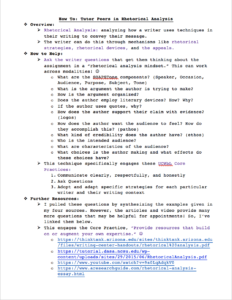I’ve encountered a slew of rhetorical analysis appointments here at the UCWbL. Often times, the students come in confused about what a “rhetorical analysis” even entails and what they are missing. The passion I have for the topic, combined with the necessity of it being understood here at the UCWbL, made this the perfect candidate for some further research.
What is Rhetorical Analysis?
My findings were both comforting and informative. I learned that my prior knowledge of rhetorical analysis was pretty solid. The sources I turned to, three articles and a video made by a rhetoric professor, confirmed the definition that I had been explaining to peers during appointments. While each source varied a bit in its wording and the specific details it focused on, the three articles all seemed to agree on a general definition–that rhetorical analysis is about looking at a piece and determining how the author uses techniques in their writing to convey their overall message. The video, while largely in agreement, presented the definition in a slightly different way–that it’s an analysis of how the writer makes choices that have certain effects on the audience.
Beyond definitions, the sources articulated certain components that are good to consider in writing a rhetorical analysis. These concepts–things like the rhetorical situation, rhetorical strategies & devices, and the appeals–are all ways that the author is able to communicate their certain purpose to their readers. Distinct definitions and more information can be found in the resources linked below.
How Can We Help Students?
This was the area where I was really hoping to gain more insight. I had been explaining rhetorical analysis to confused writers already, but I wanted to be able to help them more beyond the general level. I wanted to be able to aid them in beginning to understand how to write a rhetorical analysis on their specific text. Across the board, all my sources seemed to agree on what to do in this case… ASK QUESTIONS!
By asking the writer questions like…
- What is the argument the author is trying to make here?
- Where in the text do you see that?
- Does the author use quotes or literary devices? How and why?
…you can help students construct a rhetorical analysis for the specific piece of writing that they are examining.
And, of course, these are not all the questions that could be asked. In fact, I created a handout that can be referenced during tutoring appointments to facilitate these “rhetorical analysis mindset questions.”
The sources below also contain lots more information and helpful questions.
Sources:
Rhetorical Analysis handout from the University of Arizona
Rhetorical Analysis handout and worksheet from NC State University
“What Is a Rhetorical Analysis?” (video) by Dr. Kyle Stedman
“What Is a Rhetorical Analysis Essay?” from A Research Guide

